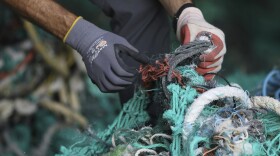Some Hawaii public schools have welcomed back students for in-person classes. But parents say it puts them in a difficult spot: how can they decide if it’s safe to send their kids back to campus?
Kauai's Kapaa Elementary School teacher Laura Burton sings a song that she teaches her kindergarteners to wash their hands. Her students are back in class. They alternate when they’re learning in person -- two days in one week, three days the next.
Heather Sokei is another kindergarten teacher at Kapaa Elementary. "We've been back since right after fall break," she said.
Her young students are also split into two groups. On any class day, she teaches about 10 kids at a time.
They sit six feet apart with masks on -- for most of the day.
"There's a few that, like, they put it above their face or what not but they just need a quick reminder, 'Put your mask on,' and they're good. Even recess, they are pretty good with just staying with our class," she said.
The state Department of Education is letting complex superintendents decide if schools will reopen.
It was clearly an easier choice for schools on Kauai, where the COVID-19 case count has been low.
Kauai Superintendent Paul Zina explained that he wants to bring back as many elementary school students as possible to start.
“The smaller schools are able to come back to where they might go to school every other day already,” he said. “The only limit to that is the social distancing limit. So the physical facility of the school is what's in most cases, preventing us from bringing back more of the students safely.”
Still, it’s parents who ultimately choose if their children return to class. To say it’s not an easy choice is an understatement.
Ask Kauai High School english instructor Jonathan Medeiros who is both a teacher and parent.
He has two elementary school daughters, and his wife also teaches at an elementary school.
Both parents and the children were conflicted about returning to school in-person.
"My daughters had mixed feelings," he said. "One of them had a couple of full on breakdowns, like did not want to go back to campus. Full-on stress breakdowns about it -- 'I want to just keep doing school on distance learning.' She was stressed out, which then of course, stresses us out."
Mediros thinks most of his daughter's stress came from the change in routine.
"That's a stress," he said. "To continuously tell students and families that, well, it's going to be different again."
Zina explained that he's tried to notify families two to three weeks before the end of the quarter with any adjustments that are being made.
"We believe that that gives families a significant amount of time to make adjustments to their own work and other family schedules that affect them," Zina said.
The state Board of Education require schools to give parents at least a two weeks notice before moving between distance and in-person learning.
It turns out, parents don’t need to decide whether to return their children to school all by themselves.
Emily Oster is a health economist who’s helping parents with their dilemma.
She teamed up with Maven, a women’s healthcare company. It’s created an interactive decision making system that helps parents weigh the risk and rewards of in-person learning.
"Many of the most important factors have to do with what is your capacity to make these different choices," Oster said. "So in a family in which it's feasible for one the adults in the household to be home with the child, you're going to have a different approach than if that's really not an option on the table. What are really your choices gets a lot of weight. And then, there's also these questions of how worried are you about the virus? How high risk is your family?"
She says understanding the individual questions helps parents weigh whether to send their children back to campus.
Medeiros says he’s happy about how it’s been going so far with his daughters back learning in-person.
"I think overall, it is a positive. They have amazing teachers, and they love being with those teachers, physically. It's been a stress on our schedule as a family.But we're figuring it out," he said.
Teachers Sokei and Burton also say most parents were happy to send their children back to class.
But all agreed that if Kauai had a higher level of infection, their reaction might be different.
Oster advises parents to get clear information from their children’s schools, like the number of teachers and students on campus, for instance.
And find out the number of COVID cases at each school and how officials respond to any infections. They should ask what steps are taken to prevent transmission and how they’re enforced.
Oster's decision tool, tips and advice are available on the Maven Clinic website.




